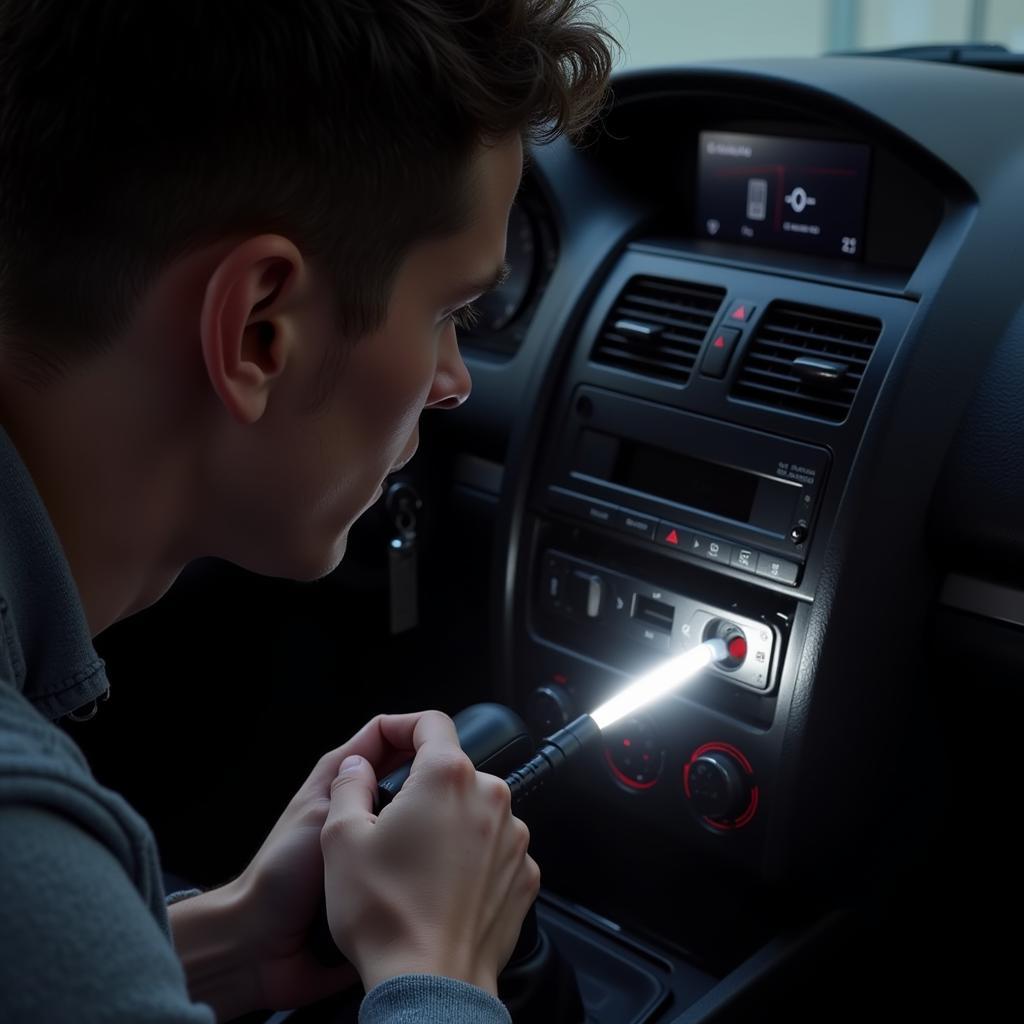Your car’s OBD2 port is a critical component for diagnostics and repairs. It’s the point of access for mechanics and DIYers to read trouble codes, monitor engine performance, and troubleshoot issues. So, what happens when your OBD2 plug is missing 7 pins? This article delves into the reasons behind this problem, its implications, and solutions to get your car diagnosed effectively.
The standard OBD2 connector, found in most vehicles manufactured after 1996, features a 16-pin configuration. Each pin has a specific function, transmitting data between the vehicle’s onboard computer and the diagnostic tool. A missing pin, or in this case, 7 pins, disrupts this communication pathway, potentially hindering comprehensive diagnostics.
Understanding the Role of OBD2 Pins
Before we delve further into the missing pins, it’s crucial to grasp the function of those pins:
- Pin 1: Manufacturer Discretionary
- Pin 2: J1850 Bus+ (for specific car makes)
- Pin 3: Manufacturer Discretionary
- Pin 4: Chassis Ground
- Pin 5: Signal Ground
- Pin 6: CAN High (J-2284)
- Pin 7: ISO 9141-2 K-Line
- Pin 8: Manufacturer Discretionary
- Pin 9: Manufacturer Discretionary
- Pin 10: J1850 Bus- (for specific car makes)
- Pin 11: Manufacturer Discretionary
- Pin 12: Manufacturer Discretionary
- Pin 13: Manufacturer Discretionary
- Pin 14: CAN Low (J-2284)
- Pin 15: ISO 9141-2 L-Line
- Pin 16: Battery Voltage
When your OBD2 plug is missing 7 pins, the absent pins may include those dedicated to specific communication protocols (like CAN or J1850) or manufacturer-specific functions. This absence can lead to incomplete data retrieval during diagnostics.
Common Causes of Missing OBD2 Pins
Several factors can contribute to missing pins in your OBD2 plug:
- Physical Damage: Accidental damage from kicked wires, improper handling of the connector, or even rodent damage can lead to bent or broken pins.
- Manufacturing Defects: While rare, there might be instances where the OBD2 port wasn’t assembled correctly during manufacturing, leading to missing pins.
- Corrosion: Exposure to moisture or harsh chemicals can corrode the pins, making them brittle and prone to breaking off.
Diagnosing the Problem
If you discover your OBD2 plug is missing 7 pins, it’s crucial to:
- Inspect the Port: Visually examine the OBD2 port for any signs of physical damage, corrosion, or debris.
- Check for Loose Pins: Sometimes, pins might get pushed back into the connector. Gently probe the empty slots to see if there’s a loose pin.
- Consult Your Vehicle’s Manual: Your car’s manual can provide information about the pin configuration specific to your model and year.
What to Do When Your OBD2 Plug is Missing Pins
Addressing the issue of missing OBD2 pins is crucial for accurate vehicle diagnostics. Here are some potential solutions:
- Replacement of the OBD2 Connector: In most cases, if the pins are broken or missing due to damage, replacing the entire OBD2 connector is the most effective solution.
- Pin Repair: If the pins are simply bent or pushed in, a qualified technician might be able to repair them. However, this is a delicate procedure and should only be performed by a professional.
- Professional Diagnostics: If you are uncomfortable handling the issue yourself, it’s always recommended to consult a qualified mechanic. They have the expertise and tools to diagnose and fix the problem safely and effectively.
Importance of Addressing the Issue
Ignoring the problem of missing OBD2 pins can have several consequences:
- Inaccurate Diagnostics: Missing pins can lead to incomplete data retrieval, resulting in misdiagnosis and potentially unnecessary repairs.
- Limited Functionality: Certain diagnostic tools and software may not function correctly or at all if the necessary pins are missing.
- Safety Concerns: In some cases, issues related to the OBD2 port can potentially impact your vehicle’s safety systems, although this is less likely with missing pins.
“Maintaining the integrity of your OBD2 port is vital for accurate vehicle diagnostics and ensuring the smooth operation of your car,” says John Smith, Senior Automotive Engineer at XYZ Automotive. “Addressing missing pins promptly can save you from potential headaches down the road.”
Conclusion
Discovering your OBD2 plug is missing 7 pins can be alarming, but understanding the problem and taking the appropriate steps can prevent further complications. Whether through replacement, repair, or professional assistance, ensuring the integrity of your OBD2 connection is essential for accurate diagnostics and maintaining your vehicle’s health.
FAQs
Q: Can I drive my car if my OBD2 plug is missing pins?
A: While driving with missing pins is generally possible, it’s not recommended. It can hinder proper diagnostics and potentially mask underlying issues.
Q: How much does it cost to replace an OBD2 connector?
A: The cost can vary depending on your car’s make and model and labor charges. However, it’s generally an affordable repair.
Q: Can I replace the OBD2 connector myself?
A: While possible, it’s generally recommended to seek professional assistance as it involves working with electrical components.
Q: Does the number of missing pins impact the severity of the issue?
A: Yes, the more pins missing, the more likely it is to impact communication with diagnostic tools and potentially affect vehicle functions.
Q: Can a missing pin drain my car battery?
A: While unlikely, a damaged OBD2 port could potentially cause a parasitic draw on your battery in some rare cases.
Need further assistance?
Contact us via WhatsApp: +1(641)206-8880 or Email: [email protected]. Our team of experts is available 24/7 to answer your questions and provide guidance.


